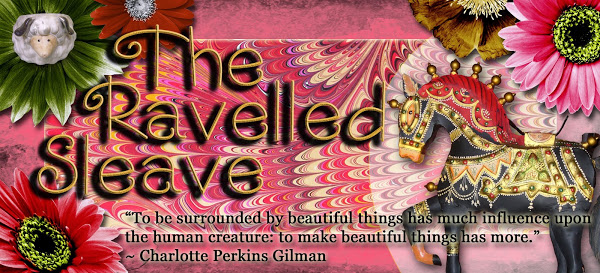
verb (used with object), rav·eled, rav·el·ing or (especially British) rav·elled, rav·el·ling.
- to disentangle or unravel the threads or fibers of (a woven or knitted fabric, rope, etc.).
- to tangle or entangle.
- to involve; confuse; perplex.
- to make clear; unravel (often followed by out).
verb (used without object), rav·eled, rav·el·ing or (especially British) rav·elled, rav·el·ling.
- to become disjoined thread by thread or fiber by fiber; fray.
- to become tangled.
- to become confused or perplexed.
- (of a road surface) to lose aggregate.
noun
- a tangle or complication.
verb -els, -elling or -elled or US -els, -eling or -eled
- to tangle (threads, fibres, etc) or (of threads, fibres, etc) to become entangled
- (often foll by out) to tease or draw out (the fibres of a fabric or garment) or (of a garment or fabric) to fray out in loose ends; unravel
- (tr usually foll by out) to disentangle or resolveto ravel out a complicated story
- to break up (a road surface) in patches or (of a road surface) to begin to break up; fret; scab
- archaic to make or become confused or complicated
noun
- a tangle or complication
noun
- Maurice (Joseph) (mɔris). 1875–1937, French composer, noted for his use of unresolved dissonances and mastery of tone colour. His works include Gaspard de la Nuit (1908) and Le Tombeau de Couperin (1917) for piano, Boléro (1928) for orchestra, and the ballet Daphnis et Chloé (1912)
1580s, “to untangle, disentangle, unwind” (originally with out), also “to entangle, become tangled or confused,” from Dutch ravelen “to tangle, fray,” rafelen “to unweave,” from rafel “frayed thread.” The seemingly contradictory senses of this word (ravel and unravel are both synonyms and antonyms) are reconciled by its roots in weaving and sewing: as threads become unwoven, they get tangled.
1630s, “a tangle;” 1832, “a broken thread,” from ravel (v.).
 Liberal Dictionary English Dictionary
Liberal Dictionary English Dictionary